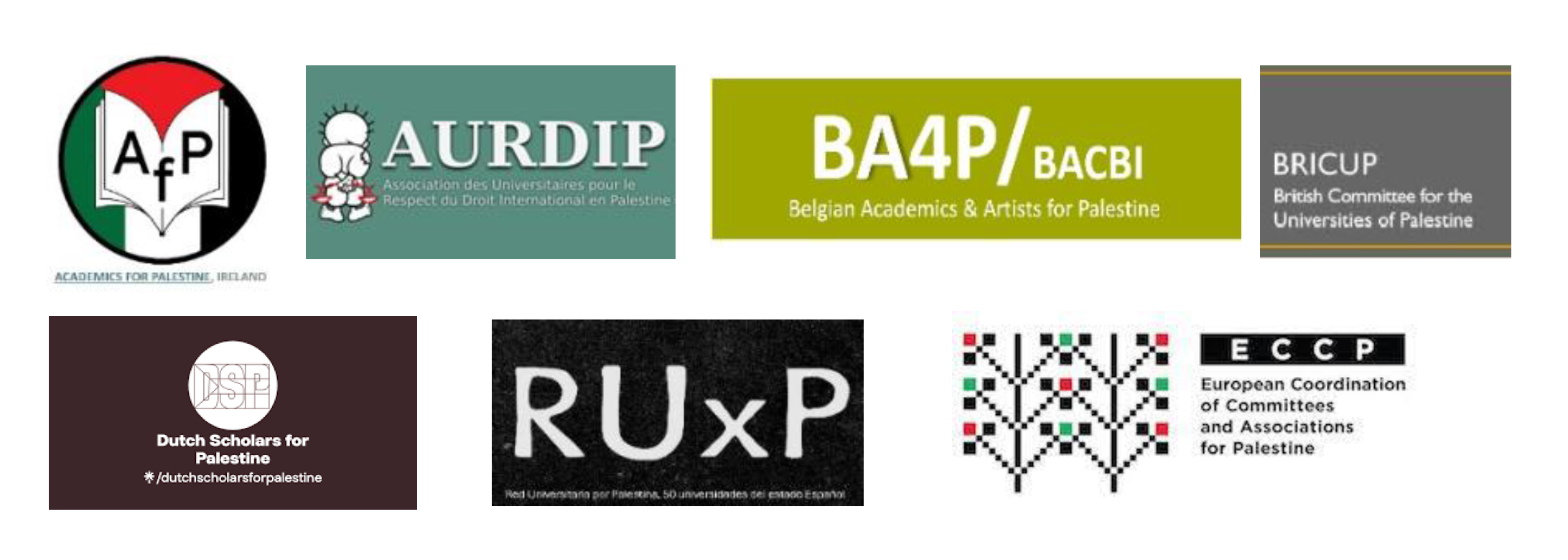On October 15, a delegation representing European academics, with AURDIP among them, was received by the office of Commissioner Zaharieva, who is in charge of start-ups, research, and innovation at the European Commission. Here is the meeting report and the press release. We came away deeply disappointed, and the situation calls for further action.

Press release, 1 November 2025
In the context of the acute genocidal phase in Gaza since October 2023, a group of European academics has been pressuring the EU Commissioner for Startups, Research & Innovation to exclude Israel from the European research funding programmes. They circulated two petitions and published an open letter in July 2025, leading to a meeting with some members of the Commissioner’s cabinet in Brussels on October 15. There, a delegation of academics reminded the Commissioner’s cabinet of EU’s legal obligation to prevent and punish genocide. They illustrated their demands with a long list of problematic Israeli partners and projects. One week later, the EU Commissioner confirmed keeping on ignoring these facts by stating in a letter that the EU ethics screening did not identify any activities in these projects going “beyond the required exclusive focus on civil applications”. Moreover, the cabinet members made it very clear that they consider the EU actions in general to be lawful and showed no intention of being convinced of the contrary.
The Israeli military/security industrial complex has been the major apparatus used to maintain the 58 year-long occupation, apartheid and oppression of Palestinian people. Since 1997, the EU has been feeding this system with €3 billion of funding through research programmes including the current Horizon Europe scheme. This is on the top of €8 billion channelled to Israel’s weapon companies. Civil society and academics have repeatedly raised ethical concerns due to the gross human rights violations in the Occupied Palestinian Territory (OPT). Even after 7 October 2023, €126M went to 130 new projects involving Israeli partners.
As a consequence, a group of academics has been requested from EU to suspend all ties with Israeli research institutions and to disclose the ethical reviews of projects involving Israeli partners and the monitoring procedures and practices of such projects. Their petition in July 2025 has been endorsed by 75 organisations and 4,500 university staff, academics and students. During the meeting with the EU Commissioner’s cabinet members on 15 October, they reminded the EU’s obligation to prevent and punish genocide, including through cooperation in ensuring accountability. They also highlighted that the Commission has both the legal authority and contractual tools to act. The Commissioner’s cabinet was additionally reminded that its inaction punishes European universities and researchers that are stuck in projects violating their own moral and legal obligations. The delegation selected a (large) subset of problematic Israeli partners and projects to illustrate the issue of dual use in the intricated Israeli academic, industrial and governmental networks. Several of those projects are openly applicable to military goals even in the publicly available documentation of the own EU Cordis website.
Unfortunately, the Commissioner’s (cabinet’s) did not budge. Mr. Schwarz stated that “everything that EU does is legal unless proven otherwise”. He furthermore invited the academics to submit any proof of the contrary, promising their experts would be mobilized to review it. Which is ironical considering that such evidence was sent already months before to the EU, and completely ignored, as confirmed a week later in a letter from Commissioner Zaharieva: “I would like to confirm once again that all projects listed in your letter went through an ethics screening as part of the evaluation process (be it for Horizon 2020 or Horizon Europe), and the evaluators did not conclude that any of the proposed activities in those projects go beyond the required exclusive focus on civil applications.” Finally, the cabinet’s members explained that the EU’s strategy is to mostly focus on the fact that a ceasefire was reached and to monitor Rafah to ensure passage of humanitarian aid. Two weeks later, this strategy has not been reaching obviously convincing results.
The academics take note of the lack of reactivity of the EU Commissioner and its team and condemn its denial of the accumulation of evidence that has thoroughly been presented for months not only by them but also by others, including some media. They therefore conclude that pressure must further be increased. They intend to keep on identifying and publicizing legal violations attached to Europe-Israel research collaborations, as well as further mobilizing their academic, civil, political and media networks, with the goal of forcing the EU to take responsibility for its role in the on-going genocide, apartheid and occupation of the Palestinian people. For more information, please contact: ECCP (Europe): eccp.brussels@gmail.com, AFP (Ireland) academicsforpalestine@gmail.com; AURDIP (France) contact@aurdip.fr; BA4P (Belgium) info@bacbi.be; BRICUP (UK) j.rosenhead@lse.ac.uk; Dutch Scholars for Palestine (Netherlands) dutchscholarspalestine@gmail.com; RUXP (Spain) lera@us.es
Press contact: Nozomi Takahashi, Nozomi.takahashi@bacbi.be
